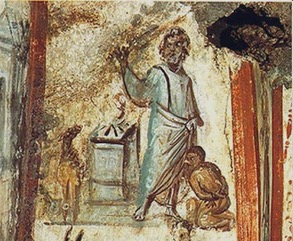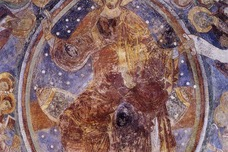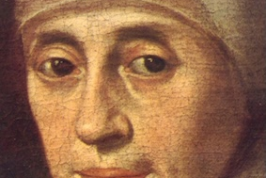Sunday Reflection with Canon Robin Gibbons: 10th August 2025

The Sacrifice of Isaac, Catacombs of Via Latina, Rome
Nineteenth Sunday in Ordinary Time
1. Faith and Hope.
Our readings this Sunday divide neatly into two parts and two distinct themes. The first theme is that discovered in the letter to the Hebrews; 'Faith is the realization of what is hoped for and evidence* of things not seen'.(Heb 11:1)But it is also present in our first reading from the book of Wisdom where we are reminded of the importance of the Passover, of what it meant to Israel-and by extension to us. It is a celebration of hope and faith in the Holy One and also a focussed reflection on how that faith in the promises made and ratified with God engendered in them courage and the desire for salvation of the just . This is part of what faith is about, putting our hope and trust in the promises of the Living God.
2. Abraham
In our second reading a number of Old Testament examples are given of those people who lived and hoped in faith, but in our portion this Sunday, it is Abraham (and with him Sarah, Isaac and Jacob) who is held up to us as the one who above all in the story of salvation, put his faith totally in the promises of a God he could not see and in a hope he himself might only understand after death. '…he thought that the one who had made the promise was trustworthy. So it was that there came forth from one man, himself as good as dead, descendants as numerous as the stars in the sky and as countless as the sands on the seashore.
All these died in faith. They did not receive what had been promised but saw it and greeted it from afar and acknowledged themselves to be strangers and aliens on earth'. (Heb 11: 11b-13) In our religious tradition Abraham holds a particular face, in a sense he is the common ancestor of three great monotheistic faiths, Judaism, Christianity and Islam, but in the context of our Christian tradition , that is of who we are now, this is acknowledged in one of our Eucharistic Prayers EP1) where the offerings of the Eucharistic sacrifice are directly linked to him and others, and he is called our father in faith:
'Be pleased to look upon these offerings
with a serene and kindly countenance,
and to accept them,
as once you were pleased to accept
the gifts of your servant Abel the just,
the sacrifice of Abraham, our father in faith,
and the offering of your high priest Melchizedek,
a holy sacrifice, a spotless victim'. (EP1)
This is not just historical background, it is a formal declaration that our own faith in the Lord Jesus Christ is revealed through the promises made to Abraham. To remind us of this each day in the Liturgy of Evening Prayer we sing in the `Magnificat, the song of Mary, these words of hope:
'God has filled the hungry with good things,
and sent the rich away empty.
God has helped servant Israel,
in remembrance of God's mercy,
according to the promise God made to our ancestors,
to Abraham and to his descendants forever'.(Lk 1:54,55)
This song is linked intimately to the utter trust and hope of Mary's own faith, discovered through her act of acceptance in the drama of the incarnation. This song places Abraham at the heart of our own journey, it is a culmination of his own trust and faith, a litany of wonder at the support and love of a just God who throughout the ages has remained consistent and constant in fulfilling the promises made to Abraham and his descendants and seen for us in the person of Jesus the Christ.
3. Discipleship means being prepared.
The second theme found in the gospel is a bit different, because faith and hope are not abstract, they exist in the context of people's lives, including lives filled with misery and pain, of sickness, loss and displacement from all that is secure. The world at the moment is filled with good things but also the very visible presence of evil acts of human beings towards one another and our small earthly home. Luke shows us Jesus telling his disciples that the Kingdom is coming, that they must not be afraid, but in faith hope for that inexhaustible treasure in heaven which can never be destroyed. Meanwhile their task is to be prepared, and to prepare others for the coming of the Son of Man. There is a harsh edge to his illustrations of servants waiting for the return of the master-and irony, for before them is the very Son of Man himself, unrecognised for who he is.
What do these readings mean for us? One point is to sustain us by remembering and celebrating those whose faith has nurtured our own down the ages-and in our prayer and work accept that the presence of the Holy One, unseen yet alive, is with us always through Christ. A second is to remind us that as part of the ;'little flock' we have a task to bring others to know and love the Lord, to support, encourage and help them on their journey of faith , but that this is a task where we are to be vigilant and prepared for His coming at any time. For we have a responsibility given us by the Lord, of service and love towards others for the sake of His name :"Much will be required of the person entrusted with much, and still more will be demanded of the person entrusted with more".(Lk 12:38b)
Lectio
Magnificat
Luke 1:46-55
My soul glorifies the Lord,
my spirit rejoices in God, my Saviour.
God looks on the lowliness of his servant
henceforth all ages will call me blessed.
The Almighty works marvels for me.
Holy is God's name!
There is mercy from age to age,
on those who fear God,
God puts forth his arm in strength
scattering the proud-hearted;
casts the mighty from their thrones,
raising the lowly,
fills the starving with good things,
sending the rich away empty.
God protects Israel, his servant,
remembering his mercy,
the mercy promised to our forbears,
for Abraham and his heirs for ever.
Praise the Father, the Son and Holy Spirit,
for ever and ever. Amen.
As used by the Cistercians of Tarawara (Australia) and Kopua (New Zealand)
1. Prayer to God the Father
I appeal to you, Lord, God of Abraham, God of Isaac, God of Jacob and Israel, You the Father of our Lord Jesus Christ. Infinitely merciful as You are, it is Your will that we should learn to know You. You made heaven and earth, You rule supreme over all that is. You are the true, the only God; there is no other god above You.
Through our Lord Jesus Christ…and the gifts of the Holy Spirit, grant that all who read what I have written here may know You, because You alone are God; let them draw strength from You; keep them from all teaching that is heretical, irreligious or godless.
by St Irenaeus of Lyons, 130-202 AD


















